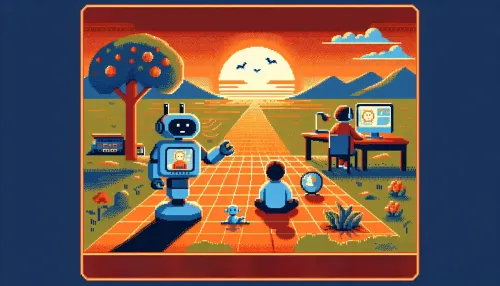Unveiling the Kaleidoscope of Innovations: Navigating the Challenges of Autism with Creative Problem-Solving

Autism spectrum disorder (ASD) presents unique challenges and opportunities, and HorizonsMind is committed to exploring innovative approaches to support autistic children. Through creative problem-solving, tailored environments, and cutting-edge technologies, we aim to empower parents, educators, and caregivers in providing holistic support for autistic individuals.
Creating Autism-Friendly Spaces Through Innovative Design
Designing spaces that cater to the sensory needs of autistic children is crucial for their well-being. Utilizing innovative design principles, such as sensory-friendly lighting, calming color schemes, and tactile surfaces, can create environments that promote comfort and reduce anxiety. As we recognize the importance of advocating for inclusive design practices that prioritize the unique sensory experiences of autistic individuals.
Engaging autistic children in strategic play not only fosters their creativity but also enhances their problem-solving abilities. Puzzles serve as pathways to cognitive development and can be tailored to accommodate various skill levels. By incorporating puzzles into educational activities, caregivers and educators can nurture critical thinking and spatial reasoning while promoting a sense of accomplishment in autistic children.
Enhancing Problem-Solving Skills with Strategic Play
Role-playing games provide a dynamic platform for autistic children to explore emotions, practice social interactions, and develop coping strategies. Through imaginative storytelling and character role-play, autistic individuals can enhance their emotional regulation and communication skills in a supportive and non-judgmental environment. It's essential to recognize the therapeutic potential of role-playing games in facilitating emotional growth and social connectivity for autistic children.
Related Article: Bridging the Gap: New Frontiers in Autism Support Through Millennial and Gen Z Innovations
Using Role-Playing Games for Emotional and Social Growth
Augmented reality (AR) technology offers immersive learning experiences that can captivate the attention of autistic children while facilitating skill development. By integrating AR applications into educational settings, educators can create interactive learning opportunities tailored to individual learning styles. As we advocate for the integration of AR technology to enhance engagement and promote multi-sensory learning experiences for autistic children.
Augmented Reality: Transforming Learning for Autistic Children
Customizable tech tools play a pivotal role in addressing communication barriers faced by autistic individuals. Speech-generating devices, text-to-speech apps, and customizable communication boards empower non-verbal or minimally verbal autistic individuals to express themselves effectively. HorizonsMind recognizes the importance of advocating for accessible and customizable communication tools that enable autistic individuals to engage with their environment and communicate their needs confidently.
Sensory overload can significantly impact the well-being of autistic children. Innovations in sensory integration tools, such as sensory-friendly wearables and noise-canceling technologies, offer practical solutions to manage sensory challenges. Supporting the development and implementation of cutting-edge sensory integration tools that empower autistic individuals to navigate sensory-rich environments with confidence and comfort.
Related Article: The Evolution of Sensory-Friendly Design: Pioneering Innovations and Their Lasting Impact on Autistic Children
Customizable Tech Tools for Overcoming Communication Barriers
Artificial intelligence (AI) holds immense potential in decoding nonverbal cues and enhancing communication experiences for autistic individuals. AI-powered systems can analyze facial expressions, gestures, and tone of voice to facilitate better understanding of nonverbal communication signals. Recognizing the transformative impact of AI in bridging communication gaps and promoting greater inclusivity for autistic individuals.
Innovative Solutions for Managing Sensory Overload
Storytelling and creativity workshops provide platforms for autistic children to explore imaginative expression while developing adaptability skills. By engaging in collaborative storytelling activities and creative workshops, autistic individuals can cultivate flexibility, resilience, and self-expression.
Related Article: The Intersection of AI and Autism: Crafting the Future of Care
The Role of AI in Enhancing Nonverbal Communication
User-centered design principles are essential in creating assistive technologies that cater to the specific needs of autistic individuals. By involving autistic voices in the design process, assistive technologies can be tailored to address unique challenges while promoting independence and empowerment. HorizonsMind champions user-centered design approaches that prioritize the input of autistic individuals in developing assistive technologies that truly resonate with their experiences.
Experiential learning models offer immersive educational experiences that foster resilience, problem-solving skills, and self-determination in autistic learners. By engaging in hands-on activities and real-world simulations, autistic children can develop grit and perseverance while honing practical skills. HorizonsMind recognizes the value of experiential learning models in shaping resilient mindsets and equipping autistic learners with essential life skills.
Cultivating Adaptability Through Storytelling Workshops
In conclusion, navigating the challenges of autism requires a multifaceted approach that embraces innovation, creativity, and inclusivity. HorizonsMind remains dedicated to shedding light on groundbreaking strategies that empower autistic children, fostering an environment where their unique strengths are celebrated, supported, and amplified.
Frequently Asked Questions
Creating autism-friendly spaces involves using sensory-friendly lighting, calming color schemes, and tactile surfaces. These design principles promote comfort and reduce anxiety for autistic individuals, making environments more inclusive and supportive of their unique sensory needs.
Role-playing games offer autistic children a platform to explore emotions and practice social interactions in a safe environment. Through imaginative storytelling, they can enhance their emotional regulation and communication skills while building confidence in social settings.
Experiential learning provides autistic learners with hands-on activities that foster resilience and problem-solving skills. By engaging in real-world simulations, these children can develop grit and perseverance, equipping them with essential life skills for future challenges.
Check Out These Related Articles

Visionary Insights: Anticipating the Next Wave of Autism Support Innovations

The Revolution of Smart Playgrounds for Autistic Children

Revolutionizing Autism Support Through Telepresence Robots
